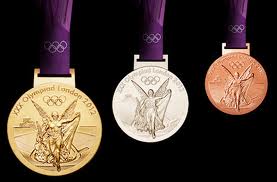So the Olympics are over for another 4 years. However, the London Olympics were so chock-a-block-full of awe-inspiring deeds that the memories will remain. And there are a couple that really stand out.
The first was Kate Walsh, the captain of the Great Britain (field) hockey team. Her jaw was broken by an opponent’s stick very early in the competition. However, instead of accepting that her Games were over, Kate had surgery to insert a steel plate in her jaw and resumed playing two days later, with a face mask and the help of some pain killing drugs. She missed only one game and her team went on to win the bronze medal.
The other was US sprinter Manteo Mitchell who broke his leg half way through the first leg of the men’s 4×400 relay. You might think this was disaster (or, at the very least, a major blow) but he ran on, finished his race and ensured that his team qualified! Describing what happened Manteo said, “As soon as I took the first step past the 200 metres mark, I felt it break. I heard it. I even put out a little war cry, but the crowd was so loud you couldn’t hear it. I didn’t want to let those three guys down, or the team down, so I just ran on. It hurt so bad.” So perhaps it was justice that his team not only qualified, but ended up winning the silver medal in the final.
Both these events are mere footnotes to the final outcome and, as the Games recede into the annals of history, are likely to be forgotten. You could say that “these things happen” and “it’s just sport and not really important.” However, if you were to do that you would be missing so much: there is so much more to them and a much greater lesson to be learned.
You see these examples epitomise what a team is all about. A team is a corps where the whole is greater than the sum of the parts and the interests of the collective transcend those of its individual members. But this only happens when there is shared purpose and a common commitment to that purpose. So, while sport provides a good – almost universal – example of this, you would make a great mistake not to seek to apply it more widely. And can you think of anywhere you could apply this more than in business? After all, a business has a purpose and therefore, by definition, everyone in the organisation is working for a single team.
Yet, unfortunately, two major distortions dilute this concept.
- The size of the organisation and the scale of its operations. All too often this means that you break the team down into smaller teams. While there is nothing inherently wrong with this, it means all too often you lose the concept of the organisation as one team. (If you doubt that, just ask yourself to what extent the concept of “need to know” pervades your organisation?)
- The pre-occupation with trying to motivate people and the almost universal belief that you do this best by creating a competitive environment that has the smaller teams vying with one another.
If you are looking for medal-winning performance you need to recognise and create this power of purpose. Only then will you have a team – dedicated people who are totally committed and who will ensure the results you are looking for. It doesn’t even have to be a gold medal, but you will never succeed without this. So start by asking, “Is there a common purpose in our organisation? Are we a single team?”

